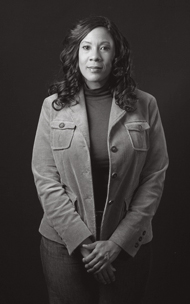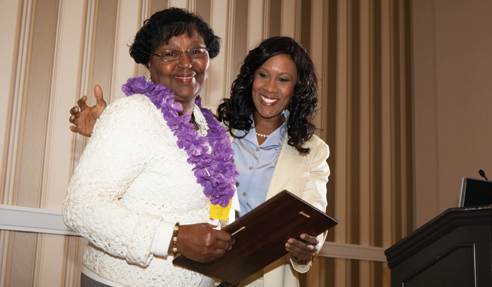Gaining Skills to Influence Public Policy
Sandra Owens-Kane, PhD
Sandra Owens-Kane, PhD, began her social work career as a case manager counseling older adult clients admitted to a private psychiatric hospital in Las Vegas, Nevada. “I was an efficient and effective social work clinician,” says Dr. Owens-Kane. But she recognized that as a full-time college professor and researcher, she could have an even greater impact on providing solutions for the problems confronting older adults and their family members.

Sandra Owens-Kane, PhD
Dr. Owens-Kane received her doctoral degree in 2000 from the University of California, Berkeley. She is now Associate Professor in the School of Social Work, University of Nevada, Las Vegas, where she teaches and conducts research on improving formal and informal caregiving for older adults. In 2006, Dr. Owens-Kane was accepted as a Hartford Social Work Faculty Scholar, and it was during the Policy Leadership Institute that she realized that she could have an even broader impact on the lives of older adults in America.
“One of the most pivotal career experiences I had as a Hartford Social Work Faculty Scholar was the two days we spent in Washington, D.C. at the Policy Leadership Institute,” says Dr. Owens-Kane. The Institute demystified the process of policy making by taking scholars to Capitol Hill and allowing them to learn from key political constituents. “I felt like an active participant in the American political process,” she says. “And I realized that I could directly influence national legislation and policies regarding elder health care, care-giving, and other problems faced by older adults.”
Dr. Owens-Kane embraced the opportunity to meet with staff members in the offices of Senators Harry Reid and John Ensign. She briefed Congressional staffers about her research on the needs of older Americans and their caregivers. She also volunteered to be a resource for the Senators around legislation they were drafting, including the Lifespan Respite Care Act, which was later passed into law. She provided Nevada state and national data, agency reports, and peer-reviewed scholarly articles. These initial exchanges were the start of a lasting relationship. Dr. Owens-Kane contacts the Senators’ staff every six months to offer information or to ask them to support aging-focused legislation.
 Dr. Sandra Owens-Kane with her mentor Letha A. Chadiha, PhD, at the 2008 GSA Conference presenting her with the Mentorship of the Year award.
Dr. Sandra Owens-Kane with her mentor Letha A. Chadiha, PhD, at the 2008 GSA Conference presenting her with the Mentorship of the Year award.
Dr. Owens-Kane also applied the knowledge and skills she learned at the Hartford Policy Leadership Institute to her local advocacy work. For example, she was appointed to the Nevada Strategic Plan for Senior Services Accountability Committee. She was invited to be an expert panelist to discuss elder issues following the Las Vegas preview of the PBS documentary “Caring for Your Parents,” and she was invited by the National Association of Social Workers to present her insights into why social workers should pursue a career in aging services.
Dr. Owens-Kane co-authored a research article titled “Family Caregiving to Older Adults,” which is published in the 2008 edition of the Encyclopedia of Social Work. Dr. Owens-Kane credits the Policy Leadership Institute with helping to enhance her state and national recognition as an expert on aging issues.
Dr. Owens-Kane also catapulted herself onto the national political stage as an alternate Nevada state delegate to the Democratic National Convention in Denver in 2008. A treasured bonus of her grassroots volunteer political work during the primary election was the opportunity to meet Barack Obama and to speak with Michelle Obama about national elder caregiving problems.
Now Dr. Owens-Kane is contemplating running for public office herself. “The Hartford Policy Leadership Institute helped me to develop the underpinnings of my future geriatric-focused advocacy work,” she says. “Without the Institute, I would not have had the courage to become so politically involved.”
Next: A Call to Leaders in Education
Association of Directors of Geriatric Academic Programs:
Geriatrics Leadership Scholars Program ›
